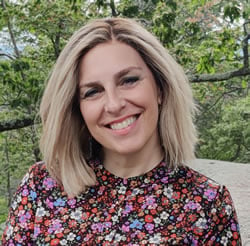A few weeks ago, our friend Rabbi Avraham Rothman, a rabbi of the Aish HaTorah congregation in our community, invited my husband and I to join him at the premier of a groundbreaking new film that I consider a must-watch for anyone who values his freedom: "The Third Jihad."
The film confirmed a gradual shift in my perspective that has been germinating for some time now.
I used to think in terms of black and white. An idea, response, conviction or action was either right or wrong.
Some ideas or principles are just always good. Take kindness and generosity—how could you possibly go wrong by being nice to people? Same with finding depth and spiritual meaning, seemingly a positive course for leading a more valuable life. Ditto for freedom, equality, justice and liberty as cornerstones for what every human being needs and deserves.
But as time goes on, I realize that the same principle can be both right and wrong, depending on its measure and extreme. Moreover, the very same ideal can bring the greatest beauty and goodness to our world— or wreak absolute havoc and evil brutality.
The Third Jihad tells the account of one brave Muslim American doctor, Dr. Zuhdi Jasser. The film is based on the FBI's release of a radical Islamist manifesto outlining a plan to destroy America from within, by taking advantage of the United States' democratic process.
Through chilling video footage of radical Islamists throughout the world, as well as interviews with experts in the fields of defense and international terror, the film clearly depicts the Islamic goal of world domination.
To achieve their goal, the radical Islamists employ both hostile as well as peaceful methods.
Through building terror networks and committing acts of terror throughout the free world, Islamists call attention to their cause while inflicting untold damage and horror to Western sensibilities and intimidate into silence those who would oppose them.
Their "peaceful" means There are very few individuals who are aware of and are openly fighting this agenda. Fewer yet are Muslims. include mass immigration to infiltrate our societies, as well as funding the sending of fanatical Imams from the hotbed of their radical societies, like Saudi Arabia, to teach, preach and convert as many as they can to their harsh interpretation of the Sharia (Islamic law). Hardened criminals are converted to Islam by Imams who arrive at their prison cells to win them over and convert them, and later build for them special communities, like Islamberg in Upstate N.Y., from where they can channel their aggressive energies to destroy Western society.
Compounding the danger is the fact that a significant and growing percentage of Muslims are increasingly identifying with the extreme and repugnant ideologies espoused by Islam's most radical elements. With its high birthrate and its aggressive recruitment efforts, Islam is the fastest growing religion in the world today. In Europe, for example, Muslims already represent 20% of the population, and Islamic propaganda assures its faithful that by the year 2050, Muslims will be the largest segment of the European population. All this make the threat posed by radical Islam all the more frightening.
Most frightening about this perilous situation is that this is a well kept secret (to which our press associations are apparently willing corroborators—but more on that later).
And the large grants provided to departments of Middle Eastern Studies in prestigious Ivy League universities also ensure that a sympathetic approach to Radical Islam is taught by our society's "intellectuals" and then advocated by the student population.
There are very few individuals who are aware of and are openly fighting this agenda. Fewer yet are Muslims.
Dr. Zuhdi Jasser, a Muslim physician, is an exception. His amazing courage in fighting the radical Islamist agenda by increasing public awareness of this menace—despite the risk to his life—provides a valuable lesson for all of us, about the ability of every individual to make a difference in our world by standing up for one's convictions.
Distorting Something Positive: Idealization of the Afterlife
The Third Jihad is a chilling message to the West to awaken and realize the threat facing its very existence, its democratic way of life and value system.
But as I watched this gripping video, my recurring thought was how a positive ideal could become absolutely evil if distorted from its proper context or taken to too extreme a measure.
As I watched the Rather than cherishing life as the precious gift that it is, death becomes a means to attaining one's most gratifying pleasures in some spiritual Afterlife. footage documenting Radical Islamists' goal to enforce Sharia worldwide, I couldn't help but think of the surface similarities to many universal religious values. Yet, while the values may be similar at the starting point, how different are the results and end goals.
At the core of Islamic teaching is the realization of the temporality of physical existence and submission to a Higher Power. Infuse your life with a higher purpose, the Imams preach, where the spiritual reigns supreme.
This is a beautiful ideal. One that Western society, with its feverish pursuit of materialism at the expense of spiritual wellbeing, has much to learn from. Valuing a spiritual existence is a positive core value.
This lofty ideal, however, is distorted by fanatical extremism. Taken to the extreme of Radical Islam, physical life becomes meaningless. Rather than cherishing life as the precious gift that it is, death becomes a means to attaining one's most gratifying (physical) pleasures in some spiritual Afterlife.
One religious woman shown in the film is respected by her co-religionists for being the mother of three suicide bombers. She proudly and unflinchingly declares that she would be thrilled to send all her ten sons to their death for the noble cause of Islam.
In another frame, young children proudly demonstrate their "military" training—to execute suicide bombings.
The underlying theme in all this is the ideal that our physical life is temporary while the eternal and most meaningful life is in the hereafter. That is why a mother is willing to send her child, or even all her children, to their deaths along with as many "infidels" as possible.
The result of this extreme application is that rather than fostering a more spiritual lifestyle in our world, the greatest atrocities are committed because life in the here and now has become insignificant. This distorted focus also results in the debasement of the entire concept of the spiritual Afterlife, which becomes merely a means for attaining one's most perverted lusts.
On the other extreme, in Western society, material luxuries are pursued despite the steep spiritual price and the neglect of our soul's wellbeing. The pursuit of physical pleasures has become revered, while spiritual growth has become unimportant, relegated, at most, to a back burner, somewhere way down on our long list of essential priorities, the top of which is dominated by items needed to enhance our material standard of living.
In contrast to both radical Islam and Western society, in Judaism, a spiritual life does not come at the expense of the physical. Physical or material existence is not meant to be disregarded, but rather used, channeled and sanctified for a divine purpose. Our physical world and physical life need not be sinful, debased or disdainful, but a medium for a greater spiritual existence—which the spiritual soul alone, without a physical body or physical world, is incapable of attaining.
So hallowed and cherished Physical or material existence is not meant to be disregarded, but rather used, channeled and sanctified for a divine purpose. is our time in this world, as an opportunity to refine and channel our physical reality for greater goodness, that the Sages state, "Greater is one hour of doing good deeds in this world than all the time in the world to come." For this reason, saving a life is the greatest virtue and most pressing commandment, for which other commandments are overridden. Moreover, in Judaism, the spiritual worlds are but "waiting stops" for the soul, until the most ideal of times comes, when the redemption will happen here, on this physical world, and all souls will return to their physical bodies.
Similarly, it can be argued that capital sentences – which are regular and frequent occurrences in Islamic societies, along with the ghastly "honor killings" – for severe or immoral crimes are an important deterrent against crime. However, this too, taken to an extreme, by becoming a common occurrence, merely debases life rather than encouraging a greater, more refined way of living.
In Judaism, there are also capital crimes. But though the law permitted capital punishment for severe offenses, the courts were enjoined to spare no effort in finding reasons to acquit. Consequently, executions were so rare that the Talmud derogatorily refers to a Court of Law that has executed even one individual in seventy years as a "murderous court."
Because life is cherished as the most precious gift that G‑d has given us.
Belief in the Afterlife or belief in a more spiritual existence needs to provide us with the impetus to live more meaningful lives that are not geared only to immediate gratification, but in which we work towards refining ourselves into better, more loving, more harmonious and more giving individuals. If belief in the Afterlife, however, causes a disregard for the sanctity of life—ours and our fellow humans'—as well as a disdain for physical pleasures in this world only to expect them in their most lustful, debased form in the world to come, then this belief has become an escape mechanism to permit the greatest perversions, brutalities and atrocities—all supposedly in the name of G‑d.
Stay tuned for "Part Two: When Liberty and Equality Become an End Goal"






